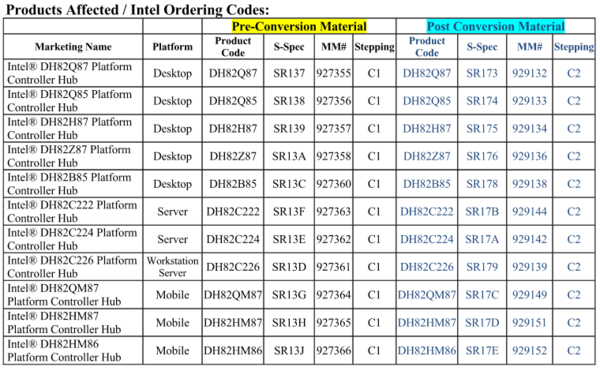Intel Confirms, Fixes Haswell's USB 3.0 S3 Sleep Problems
Intel has issued a Product Change Notification (PCN) to correct Haswell's USB 3.0 S3 sleep problems.
On March 1st, it was revealed that Intel's upcoming fourth generation "Haswell" processors was having issues when waking from S3 sleep with a device plugged into a USB 3.0 port. Specifically this implementation problem resulted in a number of nuisance issues such as having blank pages displayed in PDFs and video that stops and cannot be resumed.
To resolve this issue, Intel has now issued an official Product Change Notification (PCN) that alters the chipset stepping from C1 to C2, a hardware fix that is expected to affect the delivery dates of a fairly wide range of products. According to the release, this revision includes the Z87, H87, Q85, Q87, C222, C224 and C226, QM87, HM87 and HM86 chipsets.
When asked for comment, Intel provided the following statement to Hardware.info:
“4th gen Core is on track for a mid-year launch. Intel issued a PCN documenting a chipset USB errata and stating that chipsets with the errata will be in production during the initial ramp. But Intel has confirmed that there is no chance of data loss or corruption. This issue has only been observed with a small subset of USB SuperSpeed thumb drives and does not affect other USB peripherals. We take all customer issues seriously and should any customer have a question or concern they can always contact Intel customer support.”
Though Haswell's S3 sleep issues all fell in the "nuisance" category and could all be resolved by a simple restart of the affected application, it's excellent to see that Intel has officially acknowledged the problem, implemented a fix and perhaps most importantly, not knowingly put defective products onto the market.
Contact Us for News Tips, Corrections and Feedback
Get Tom's Hardware's best news and in-depth reviews, straight to your inbox.
Tarun Iyer was a contributor for Tom's Hardware who wrote news covering a wide range of technology topics, including processors, graphics cards, cooling systems, and computer peripherals. He also covered tech trends such as the development of adaptive all-in-one PCs.
-
phamhlam rgd1101It that mean we don't have to worry about getting C1.Reply
Learn proper English please or do a grammar check. -
warezme Doesn't is seem they have the same sleep issue with every other new generation they come out with?Reply -
dragonsqrrl I thought this was a problem with the cipsets and not the processors themselves. This article makes it sound like the C2 stepping is being applied to the processors, then in the next sentence the cipsets are actually receiving the revision.Reply -
mouse24 rgd1101It that mean we don't have to worry about getting C1.I assume it means that we shouldn't have to worry about getting any C1 stepping. Though I am not entirely sure, perhaps they will just tack on a "C1" at the end of the model number for a while (until they are out of c1 stock)Reply
phamhlamLearn proper English please or do a grammar check.Thats not right, don't go after a good guy like rgd, hes asking a question and its easily discernible as to what he means. I see him helping out people on the forums a lot. Good guy.
-
computerguy72 Kudos to Intel for admitting an issue, correcting it and insuring the version with the issue does not hit any customers. A lot of companies would have handled an issue like that poorly.Reply -
ojas sonofliberty08intel always having problem when waking from sleepIntel always correcting it too :DReply -
bugster9 Reminds of the serial comm port bugaboo when the P5-60 was released. Never forget the day that behemoth from Gateway showed up and the system froze the minute I eagerly awaited the modem negotiation with Compuserve. Guess I'm showing my age but at least this time they caught it before it shipped.Reply
